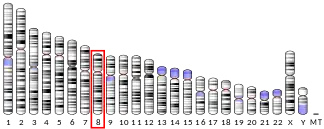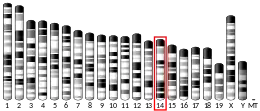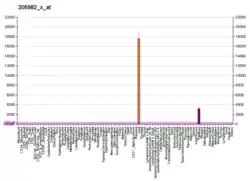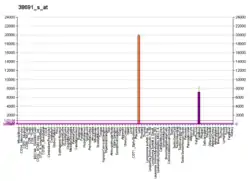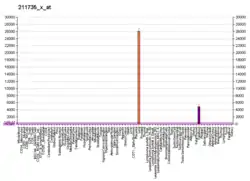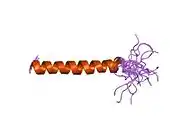Surfactant protein C
Surfactant protein C (SP-C), is one of the pulmonary surfactant proteins. In humans this is encoded by the SFTPC gene.[5][6][7]
| SFTPC | |||||||||||||||||||||||||||||||||||||||||||||||||||
|---|---|---|---|---|---|---|---|---|---|---|---|---|---|---|---|---|---|---|---|---|---|---|---|---|---|---|---|---|---|---|---|---|---|---|---|---|---|---|---|---|---|---|---|---|---|---|---|---|---|---|---|
 | |||||||||||||||||||||||||||||||||||||||||||||||||||
| |||||||||||||||||||||||||||||||||||||||||||||||||||
| Identifiers | |||||||||||||||||||||||||||||||||||||||||||||||||||
| Aliases | SFTPC, BRICD6, PSP-C, SFTP2, SMDP2, SP-C, surfactant protein C, SP5 | ||||||||||||||||||||||||||||||||||||||||||||||||||
| External IDs | OMIM: 178620 MGI: 109517 HomoloGene: 2271 GeneCards: SFTPC | ||||||||||||||||||||||||||||||||||||||||||||||||||
| |||||||||||||||||||||||||||||||||||||||||||||||||||
| |||||||||||||||||||||||||||||||||||||||||||||||||||
| |||||||||||||||||||||||||||||||||||||||||||||||||||
| |||||||||||||||||||||||||||||||||||||||||||||||||||
| |||||||||||||||||||||||||||||||||||||||||||||||||||
| Wikidata | |||||||||||||||||||||||||||||||||||||||||||||||||||
| |||||||||||||||||||||||||||||||||||||||||||||||||||
It is a membrane protein.
Structure
| Surfactant protein C, N terminal propeptide | |||||||||
|---|---|---|---|---|---|---|---|---|---|
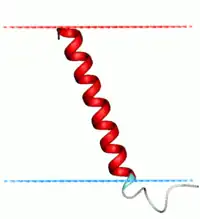 Pig SP-C, corresponds to human mature form | |||||||||
| Identifiers | |||||||||
| Symbol | SP_C-Propep | ||||||||
| Pfam | PF08999 | ||||||||
| InterPro | IPR001729 | ||||||||
| PROSITE | PDOC00298 | ||||||||
| OPM superfamily | 69 | ||||||||
| OPM protein | 1spf | ||||||||
| |||||||||
SFTPC is a 197-residue protein made up of two halves: a unique N-terminal propeptide domain and a C-terminal BRICHOS domain. The around 100-aa long propeptide domain actually contains not only the cleaved part, but also the mature peptide. It can be further broken down into a 23-aa helical transmembrane propeptide proper, the mature secreted SP-C (24-58), and a linker (59-89) that connects to the BRICHOS domain.[8]
The propeptide of pulmonary surfactant C has an N-terminal alpha-helical segment whose suggested function was stabilization of the protein structure, since the mature peptide can irreversibly transform from its native alpha-helical structure to beta-sheet aggregates and form amyloid fibrils. The correct intracellular trafficking of proSP-C has also been reported to depend on the propeptide.[9]
The structure of the BRICHOS domain has been solved. Mutations in this domain also lead to amyloid fibrils made up of the mature peptide, suggesting a chaperone activity.[8]
Clinical significance
Mutations are associated with surfactant metabolism dysfunction type 2.
Humans and animals born lacking SP-C tend to develop progressive interstitial lung disease.
Recombinant SP-C is used in Venticute, an artificial lung surfactant.
A process to mass-produce an analogue called rSP-C33Le by fusion with spidroin has been described.[10]
References
- GRCh38: Ensembl release 89: ENSG00000168484 - Ensembl, May 2017
- GRCm38: Ensembl release 89: ENSMUSG00000022097 - Ensembl, May 2017
- "Human PubMed Reference:". National Center for Biotechnology Information, U.S. National Library of Medicine.
- "Mouse PubMed Reference:". National Center for Biotechnology Information, U.S. National Library of Medicine.
- Keller A, Eistetter HR, Voss T, Schäfer KP (July 1991). "The pulmonary surfactant protein C (SP-C) precursor is a type II transmembrane protein". The Biochemical Journal. 277 ( Pt 2) (Pt 2): 493–9. doi:10.1042/bj2770493. PMC 1151261. PMID 1859376.
- Johansson H, Nordling K, Weaver TE, Johansson J (July 2006). "The Brichos domain-containing C-terminal part of pro-surfactant protein C binds to an unfolded poly-val transmembrane segment". The Journal of Biological Chemistry. 281 (30): 21032–9. doi:10.1074/jbc.M603001200. PMID 16709565.
- "Entrez Gene: SFTPC surfactant, pulmonary-associated protein C".
- Willander H, Askarieh G, Landreh M, Westermark P, Nordling K, Keränen H, et al. (February 2012). "High-resolution structure of a BRICHOS domain and its implications for anti-amyloid chaperone activity on lung surfactant protein C". Proceedings of the National Academy of Sciences of the United States of America. 109 (7): 2325–9. Bibcode:2012PNAS..109.2325W. doi:10.1073/pnas.1114740109. PMC 3289314. PMID 22308375.
- Li J, Liepinsh E, Almlén A, Thyberg J, Curstedt T, Jörnvall H, Johansson J (March 2006). "Structure and influence on stability and activity of the N-terminal propeptide part of lung surfactant protein C". The FEBS Journal. 273 (5): 926–35. doi:10.1111/j.1742-4658.2006.05124.x. PMID 16478467. S2CID 1231483.
- Kronqvist N, Sarr M, Lindqvist A, Nordling K, Otikovs M, Venturi L, et al. (May 2017). "Efficient protein production inspired by how spiders make silk". Nature Communications. 8 (1): 15504. Bibcode:2017NatCo...815504K. doi:10.1038/ncomms15504. PMC 5457526. PMID 28534479.
Further reading
- Pérez-Gil J (2002). "Lipid-protein interactions of hydrophobic proteins SP-B and SP-C in lung surfactant assembly and dynamics". Pediatric Pathology & Molecular Medicine. 20 (6): 445–69. doi:10.1080/15227950152625783. PMID 11699574.
- Solarin KO, Wang WJ, Beers MF (2002). "Synthesis and post-translational processing of surfactant protein C". Pediatric Pathology & Molecular Medicine. 20 (6): 471–500. doi:10.1080/15227950152625792. PMID 11699575.
- Johansson J, Curstedt T, Robertson B (2002). "Artificial surfactants based on analogues of SP-B and SP-C". Pediatric Pathology & Molecular Medicine. 20 (6): 501–18. doi:10.1080/15227950152625800. PMID 11699576.
- Nogee LM (2004). "Alterations in SP-B and SP-C expression in neonatal lung disease". Annual Review of Physiology. 66: 601–23. doi:10.1146/annurev.physiol.66.032102.134711. PMID 14977415.
- Brasch F, Griese M, Tredano M, Johnen G, Ochs M, Rieger C, et al. (July 2004). "Interstitial lung disease in a baby with a de novo mutation in the SFTPC gene". The European Respiratory Journal. 24 (1): 30–9. doi:10.1183/09031936.04.00000104. PMID 15293602.
- Curstedt T, Johansson J, Persson P, Eklund A, Robertson B, Löwenadler B, Jörnvall H (April 1990). "Hydrophobic surfactant-associated polypeptides: SP-C is a lipopeptide with two palmitoylated cysteine residues, whereas SP-B lacks covalently linked fatty acyl groups". Proceedings of the National Academy of Sciences of the United States of America. 87 (8): 2985–9. Bibcode:1990PNAS...87.2985C. doi:10.1073/pnas.87.8.2985. PMC 53818. PMID 2326260.
- Simatos GA, Forward KB, Morrow MR, Keough KM (June 1990). "Interaction between perdeuterated dimyristoylphosphatidylcholine and low molecular weight pulmonary surfactant protein SP-C". Biochemistry. 29 (24): 5807–14. doi:10.1021/bi00476a023. PMID 2383558.
- Glasser SW, Korfhagen TR, Perme CM, Pilot-Matias TJ, Kister SE, Whitsett JA (July 1988). "Two SP-C genes encoding human pulmonary surfactant proteolipid". The Journal of Biological Chemistry. 263 (21): 10326–31. doi:10.1016/S0021-9258(19)81519-3. PMID 2839484.
- Glasser SW, Korfhagen TR, Weaver TE, Clark JC, Pilot-Matias T, Meuth J, et al. (January 1988). "cDNA, deduced polypeptide structure and chromosomal assignment of human pulmonary surfactant proteolipid, SPL(pVal)". The Journal of Biological Chemistry. 263 (1): 9–12. doi:10.1016/S0021-9258(19)57347-1. PMID 3335510.
- Johansson J, Jörnvall H, Eklund A, Christensen N, Robertson B, Curstedt T (May 1988). "Hydrophobic 3.7 kDa surfactant polypeptide: structural characterization of the human and bovine forms". FEBS Letters. 232 (1): 61–4. doi:10.1016/0014-5793(88)80386-7. PMID 3366248. S2CID 29388224.
- Warr RG, Hawgood S, Buckley DI, Crisp TM, Schilling J, Benson BJ, et al. (November 1987). "Low molecular weight human pulmonary surfactant protein (SP5): isolation, characterization, and cDNA and amino acid sequences". Proceedings of the National Academy of Sciences of the United States of America. 84 (22): 7915–9. Bibcode:1987PNAS...84.7915W. doi:10.1073/pnas.84.22.7915. PMC 299446. PMID 3479771.
- Young WA (May 1966). "Familial fibrocystic pulmonary dysplasia: a new case in a known affected family". Canadian Medical Association Journal. 94 (20): 1059–61. PMC 1935417. PMID 5942662.
- Wood S, Yaremko ML, Schertzer M, Kelemen PR, Minna J, Westbrook CA (December 1994). "Mapping of the pulmonary surfactant SP5 (SFTP2) locus to 8p21 and characterization of a microsatellite repeat marker that shows frequent loss of heterozygosity in human carcinomas". Genomics. 24 (3): 597–600. doi:10.1006/geno.1994.1673. PMID 7713515.
- Hatzis D, Deiter G, deMello DE, Floros J (1994). "Human surfactant protein-C: genetic homogeneity and expression in RDS; comparison with other species". Experimental Lung Research. 20 (1): 57–72. doi:10.3109/01902149409064373. PMID 8181452.
- Nogee LM, Dunbar AE, Wert SE, Askin F, Hamvas A, Whitsett JA (February 2001). "A mutation in the surfactant protein C gene associated with familial interstitial lung disease". The New England Journal of Medicine. 344 (8): 573–9. doi:10.1056/NEJM200102223440805. PMID 11207353.
- Glasser SW, Burhans MS, Korfhagen TR, Na CL, Sly PD, Ross GF, et al. (May 2001). "Altered stability of pulmonary surfactant in SP-C-deficient mice". Proceedings of the National Academy of Sciences of the United States of America. 98 (11): 6366–71. Bibcode:2001PNAS...98.6366G. doi:10.1073/pnas.101500298. PMC 33474. PMID 11344267.
External links
- GeneReviews/NIH/NCBI/UW entry on Pulmonary Fibrosis, Familial
- Pulmonary+Surfactant-Associated+Protein+B at the U.S. National Library of Medicine Medical Subject Headings (MeSH)
